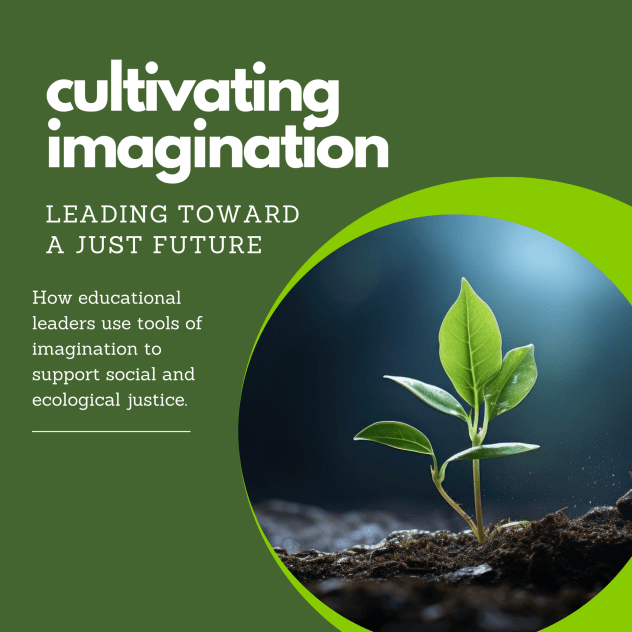By Andy Hargreaves, Visiting Professor at the University of Ottawa and Research Professor at Boston College
Note: This blog is an extension of the Cultivating Imagination podcast Episode 2: Shared Spaces, Multiple Voices- Imagining Inclusive and Sustainable Educational Ecosystems with Sean Blenkinsop and Andy Hargreaves
 A few years ago, I was elected President of an international conference organization. With the preceding president, I interviewed 10% of the membership, to learn more about the organization. The interviewees liked the organization (otherwise they wouldn’t still be members). They also told us it had become old and White. In light of this disturbing data, I determined that I would make my Presidential platform one of Generational Renewal, Inclusion and Diversity (GRID).
A few years ago, I was elected President of an international conference organization. With the preceding president, I interviewed 10% of the membership, to learn more about the organization. The interviewees liked the organization (otherwise they wouldn’t still be members). They also told us it had become old and White. In light of this disturbing data, I determined that I would make my Presidential platform one of Generational Renewal, Inclusion and Diversity (GRID).
We set up a GRID standing Committee and thought hard about who was represented on it. We developed a more diverse keynote speaker platform in terms of gender, generation, gender identity, ethnicity, nationality, and field of study. We encouraged our more visibly diverse members to run for office and when they didn’t get elected, we devised ways for them to take on more prominent roles in our community so people would get to know them better. We held congresses in places like Singapore and Morocco to bring in new members and speakers.
All this was worthy and justified. But we also wanted to demonstrate that diversity and inclusion would make everything better and be more fun, too. So, I invented a thing called The Extreme Late Night After Dinner Speakers Club!
It addressed a long-standing problem at this congress and many others – what to do the morning after the Congress dinner. Our challenge was to create something dynamic and unmissable after dinner, at an extreme time (the morning after).
The event was loosely adapted from a UK TV music show called Later with Jools Holland. Holland’s show consisted of around five bands who would rotate on a circular stage doing a different number each, until they had all performed more than once. One of the artists was usually a legend who could draw in a crowd. The others would be younger musicians, who played in different genres, and who might just become the legends of the future. This is how Ed Sheeran made his breakthrough in 2011.
Transposing and adapting elements from this show, we created a mainstage event that was very different from a stand-up keynote, or dreaded panel. We brought together 7 or 8 very diverse speakers. We had a couple of icons to get the audience out of bed, alongside rising stars of the future. Each speaker had exactly 8 minutes. No slides. They had a lapel mike, no podium, a spotlight, and a timer. All speakers were introduced by the host, and each chose their own music to accompany their walk-on entrance. Like Holland’s musical genres, the topics had a random relationship to each other. That element of surprise, one of the most neglected emotions of learning and engagement, was a key feature. The presentations were a roaring success.
As Dennis Shirley and I argue in our new book on The Age of Identity: who do our kids think they are and how can we help them belong?, we need new approaches to Diversity, Equity, and Inclusion (DEI) that are emotionally positive and uplifting for everyone involved. They need to be more than a training strategy of disconnected sessions, provided by outside trainers, that mainly focus on talk rather than action. We particularly need more strategies built on the values of curiosity, imagination, creativity, and action that lead to people from diverse backgrounds and with different identities working together as equals on initiatives that create shared fulfilment and joy.
Curiosity is about having the interest and willingness to move towards something different and unfamiliar. It’s about having a passion for learning, and for developing a sense of wonder about something that is new and intriguingly different. Disgust and racism are about being repelled by difference. Curiosity is about being drawn to it. Teaching for diversity should introduce young people to environments in a supportive way, where they will experience difference and have their curiosity in it aroused. We were curious what a different mainstage event might look like, and about who might best make it come alive for everyone.
Imagination is about considering what it is like to be in another place, time, mind, body, or world that is different from ones that are more familiar. Through literature, film, or drama, for example, we can learn what it is like to be someone, something or someplace else – to be a different person or even a different species, like a warhorse, in a different place and time. We don’t have to be replicants of other people’s identities to understand them. Why else would all kinds of people read books like The Poisonwood Bible, or Wild Swans, if it wasn’t to engage the power of imagination? In the congress, we had to try and envision what a completely different mainstage event would look like that would advance learning, and even create joy by demonstrating diversity in a dynamic way.
Creativity involves combining, relocating, or manipulating ideas and materials to produce something new that has not existed before. The Extreme Late Night After Dinner Speakers Club took a format from a popular music show and transposed and then refashioned it to produce a transformative moment in an intellectual congress.
Action brings all these things together through planning and ideation, through trial and error, through hope and anxiety, and through culminating epiphanies of fulfilment shared together. With and without diversity, effective collaboration involves action as well as talk, and it proves itself through shared success.
DEI needn’t only be about rooting out our biases and getting us to acknowledge and atone for them. Using the power of curiosity, imagination and creativity translated into action, it can also lead to the joy and fulfilment of working and learning effectively together.
Andy Hargreaves is Visiting Professor at the University of Ottawa and Research Professor at Boston College. Hear more from our leaders in the Cultivating Imagination podcast series.


